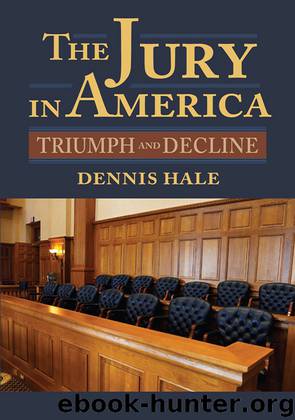The Jury in America by Dennis Hale

Author:Dennis Hale
Language: eng
Format: epub
ISBN: 9780700622016
Publisher: University Press of Kansas
Published: 2016-01-23T16:00:00+00:00
THE JURY SELECTION AND SERVICE ACT OF 1968
Although racial discrimination was the immediate concern of the Rabinowitz decision, the 1967 hearings on jury reform targeted discretion itself. All “discriminations” were suspect, not just the ones aimed at racial minorities—to exercise any discretion at all, it seemed, would be to set foot on the slipperiest of slopes. A brief colloquy between Senator Joseph Tydings (D-MD), a member of the Senate Subcommittee on Improvements in Judicial Machinery, and Attorney General Ramsey Clark, testifying on behalf of the bill, suggests the flavor of these other concerns.
Senator Tydings pressed the attorney general on the question of “subjective” standards for jury service. “Do you think,” he asked, “that a citizen should be excluded from serving on a jury, if he is so lacking in intelligence, information, probity, or good commonsense as to be unable to render satisfactory jury service?” “I think,” Clark replied, “that unless we establish an objective standard . . . we risk discrimination through subjective judgment.”65 Since racial discrimination could hardly be described as the result of “subjective judgment” or “unconscious bias”—to the racist, race is an objective fact and bias is a deliberate choice—then the bill, at least in Clark’s estimation, must have had a broader target in mind. It is hard not to draw the conclusion that the target was discretion itself, even when such discretion had no connection to the exclusion of any group from jury service, other than those who had been excluded all along—namely, those unsuited, for reasons of character or intelligence, to the difficult task of judging, or those who could legitimately claim that service would impose on them an “undue hardship.”
The focus on discretion raised the possibility that for many reformers, the very idea of a jury chosen for its qualities of character and intelligence was inconsistent with the democratic ideal. Senator Ervin’s challenge to this “reform paradigm” would now raise eyebrows at the nation’s leading law journals, except as a quaint reminder of the bad old days:
Perhaps most importantly, no changes should be made in the selection system which will have the effect of lowering the quality of Federal justice. A “jury of peers” does not require representatives of the least intelligent and the least capable of the populace, whatever their race, religion, economic status, national origin, or voting habits. The litigants who seek justice in our courts should not have their rights and their wealth, their lives and freedom placed at the mercy of the least common denominator.66
In his opening testimony, however, the attorney general stressed the importance of the “fair and impartial” jury and identified this as the goal of the administration’s bill. He identified the “problem” of the jury with citizens’ fear of being unfairly judged, but he set this problem in a context wider than race. “The law does not discriminate in choosing its litigants. It must not discriminate in choosing their peers. Because if it does . . . there comes into the decision process . . . those preferences and prejudices .
Download
This site does not store any files on its server. We only index and link to content provided by other sites. Please contact the content providers to delete copyright contents if any and email us, we'll remove relevant links or contents immediately.
The Secret History by Donna Tartt(19066)
The Social Justice Warrior Handbook by Lisa De Pasquale(12190)
Thirteen Reasons Why by Jay Asher(8897)
This Is How You Lose Her by Junot Diaz(6881)
Weapons of Math Destruction by Cathy O'Neil(6270)
Zero to One by Peter Thiel(5792)
Beartown by Fredrik Backman(5744)
The Myth of the Strong Leader by Archie Brown(5505)
The Fire Next Time by James Baldwin(5434)
How Democracies Die by Steven Levitsky & Daniel Ziblatt(5217)
Promise Me, Dad by Joe Biden(5148)
Stone's Rules by Roger Stone(5084)
A Higher Loyalty: Truth, Lies, and Leadership by James Comey(4956)
100 Deadly Skills by Clint Emerson(4922)
Rise and Kill First by Ronen Bergman(4784)
Secrecy World by Jake Bernstein(4746)
The David Icke Guide to the Global Conspiracy (and how to end it) by David Icke(4712)
The Farm by Tom Rob Smith(4504)
The Doomsday Machine by Daniel Ellsberg(4487)
